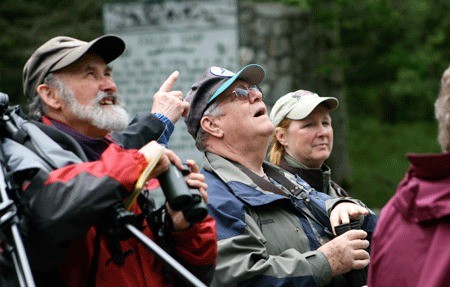Places like San Juan Island’s English Camp and Killebrew Lake on Orcas will share top billing when birding in the San Juan Islands finally lands on the map.
Not just any map, mind you.
But the seventh and final installment in a series of colorful and detailed maps that together make up Washington state Audubon Society’s Great Washington State Birding Trail.
Like the six before it, Barbara Jensen, president of San Juan’s Audubon chapter, said the map on which some of the San Juans’ better birding sites will be highlighted is geared more toward the beginner than the expert. The map is a tool that can help both visitors and Washington residents alike to become easily familiar with birds of the region, and it will be available online as well.
“You have to have a site that represents the area but a lot of it is also going to be about logistics,” Jensen said, noting that driving distance and parking availability play a part in the final selection.“The maps are good for people who are kind of new to birding, but each site will show the type of habitats and the kind of birds you’re going to see.”
That map, tentatively entitled the “Puget Sound Loop”, will highlight some 50 or more of the best spots for birding in the greater Puget Sound region, including about a half-dozen in the San Juans, and it’s due out sometime this autumn.
A volunteer committee representing Audubon’s eight different Puget Sound chapters will decide on a name when it meets May 21, and determine which sites will be on the map as well. About a dozen members of that committee took a three-day tour of Lopez, Orcas and San Juan islands last week to get a first-hand look the San Juans’ 10 or so nominated sites.
Bremerton’s Judy Willott, president of Kitsap’s Audubon chapter, noted that the amount of land in the hands of conservation groups and protected from development is a boon for birds and for San Juan birders as well.
“I think it’s really neat that you have all these areas that have been preserved,” Willott said. “That so much of it is linked, not just a little spot here and a little spot there, is important for those who like to hike and for birds.”
Beginning at Mount Rainier at the southern end, Puget Sound’s birding map will encompass Whidbey and Camano islands as it travels to its northern-most boundary, San Juan Island’s English Camp.
Launched a decade ago, the Washington State Birding Trail project drew its inspiration from a similar map depicting birding hot spots along the Texas coastline.The Washington Audubon Society has distributed more than 165,000 printed copies since its first map was published in 2002, according to Christi Norman, Birding Trail program director.
Norman said the Society chose to focus first on the rural areas in the central and eastern parts of the state at a time when those regions were in the throes of an economic downturn. Creating a map for the Puget Sound region, she added, also presented complications because its the state’s most populated area.
As is the case with previous maps, Hilary Hilscher, Birding Trail communications manager, expects the soon-to-be released Puget Sound map to help raise the profile of birding in the islands. Audubon also hopes, Hilscher said, that communities with healthy bird habitat will benefit from the exposure financially and in doing so also recognize the value of protecting habitat that so many birds depend upon.
“Natural habitat… it’s like money in the bank,” she said. “It’s money you can lean on, like your endowment.”
Birding Trail committee Chairman Brian Bell, former president of the Washington Ornithological Society, points to the community of Othello and its annual Sand Hill Crane Festival as an example. Indifference evolved into an embrace as the community realized the financial benefits of having such a festival in its backyard.
“Now the whole community is buying into it,” Bell said. “I think they came to realize that having 1,300 people coming into town can be a good thing.”
Audubon Washington: 1-866-WA-BIRDS or www.wa.audubon.org.




